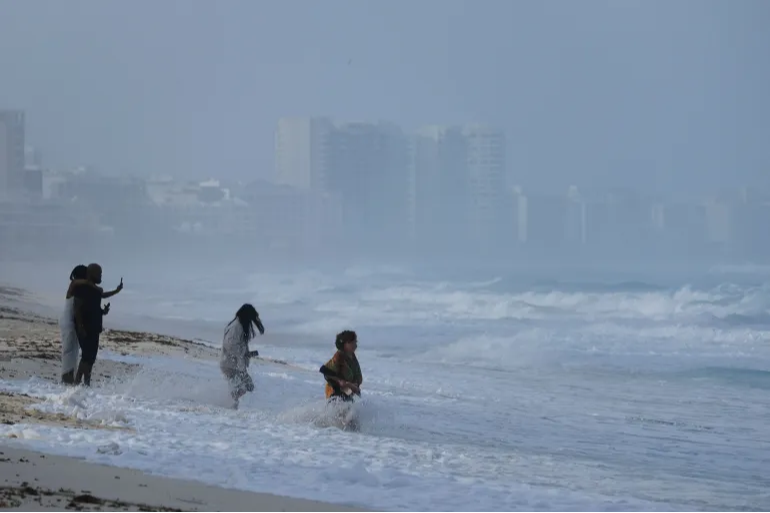Hurricane Beryl has been downgraded to a Category 2 storm as it slammed into the eastern coast of Mexico, causing widespread power outages and putting authorities on high alert.
The landfall on Friday over the Yucatan Peninsula – an area popular with tourists – came after Beryl cut a path of destruction across the Caribbean, killing at least 11 people as it swept across Jamaica, Grenada, Saint Vincent and the Grenadines, and northern Venezuela.
The first hurricane of the 2024 Atlantic hurricane season also made history, at one point reaching a Category 5 as it crossed the Atlantic Ocean. It was the earliest storm of that severity that had ever been recorded during the season, in a phenomena attributed in part to human-caused climate change.
Climate scientists have repeatedly warned of longer and more severe hurricane seasons as global temperatures continue to rise.
While Beryl’s winds slowed to 160km/h (100mph) as it reached the northeastern region of Tulum on Friday, its severity was still enough for Mexico’s civil protection agency to issue a red alert, signalling a maximum hazard threat. The agency has advised residents to remain in their homes or seek refuge in storm shelters.
No deaths were immediately reported in Mexico, according to Al Jazeera’s Lucia Newman, who reported from Playa del Carmen, Mexico. The storm was expected to pass through the Gulf of Mexico before making landfall in the U.S. state of Texas.
“The wind was hissing very, very strong. There are fallen branches. T here is no power in many areas and telephone communication is down as well,” Newman said.
“This hurricane is now heading towards the Gulf of Mexico, dying down or slowing down as it moves through Mexico, dropping water that could cause storm surges and also mudslides,” she added.
“But eventually, once it hits the Gulf of Mexico, the problem is that the warm waters there could make it strengthen yet again … So we still have Hurricane Beryl for at least a few more days according to meteorologists.”
In Quintana Roo, home to major tourist destination Cancun, Governor Mara Lezama posted a video showing strong winds and rains. He urged residents to take all necessary precautions as the storm’s impact is expected to be felt across the state.
Mexican President Andres Manuel Lopez Obrador echoed the advice, urging those in the storm’s path to seek shelter at higher elevations or other safer areas. “The most important thing is life,” he wrote on social media.
About 100 domestic and international flights scheduled between Thursday and Friday were cancelled at Cancun airport. The Mexican army has deployed approximately 8,000 troops in Tulum and said it has food supplies and 34,000 litres (9,000 gallons) of purified water to distribute to the population.
The storm had caused widespread destruction across the Caribbean, with 60 percent of Jamaica remaining without electricity early Friday.
Three people were reported killed in Grenada, three others in Saint Vincent and the Grenadines, three in Venezuela and two in Jamaica, according to officials.
While it is extremely rare for such powerful storms to form this early in the Atlantic hurricane season, which runs from early June to late November, ocean temperatures have been warmer than usual.
North Atlantic waters remain between 1 -3 degrees Celsius (1.8-5.4 degrees Fahrenheit) warmer than normal, according to the US National Oceanic and Atmospheric Administration (NOAA), contributing to the conditions needed for severe hurricanes to form.


